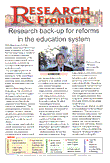 |
As well as helping to protect Hong Kong's fish farms, the research could save millions of dollars a year in existing pollution monitoring, says Principal Investigator Prof Rudolf Wu.
Excessive nutrients such as nitrogen and phosphorus in aquatic systems, a phenomenon known eutrophication, causes the blooming of microscopic algae, as in red tides. Dissolved oxygen is consumed in the blooming process, causing oxygen depletion or hypoxia. This, in turn, can lead to the mass killing of fish and aquatic animals which happens frequently all over the world. Currently, organic pollution and oxygen levels are tested by taking samples of water and measuring the oxygen content. Frequent and large scale sampling is necessary because oxygen levels can change dramatically in a short time and from one small area to another.
Prof Wu's research, scheduled for completion in September, is looking at how oxygen depletion triggers biological responses in fish, and how the responses can be employed as a pollution early warning system.
A number of observable changes may occur when fish are under pollution stress; they may produce enzymes to cope with hypoxia, they may change their RNA/DNA ratio, produce certain proteins to counter the pollution, they may modify their metabolic pathways, or they may reduce their metabolism.
The research aims to identify a set of reliable biomarkers for exposure to low oxygen, including molecular, biochemical and physiological responses when fish are exposed to pollution and oxygen depletion. Said Prof Wu: "As well as cost savings, the advantage of using biomarkers is that they provide an early warning as well as a time-integrated estimate on the dissolved oxygen level in the environment.
An early warning, potentially provided by the fish themselves, will enable prompt action to prevent a crisis."
Principal
Investigator > Prof Rudolf Wu > Email > bhrswu@cityu.edu.hk